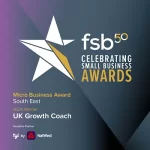Employee motivation techniques: How to foster engagement and motivation in your business
A guide to self-determination theory
Catch this month’s vlog by business coach Tim Rylatt.
Watch the video and read the extended commentary in the following blog.
Motivation is the nucleus of any successful business. It’s the driving force behind how engaged we, as business owners and staff, are in our day-to-day roles.
But what fuels motivation?
What makes us feel motivated?
How can we ensure that both ourselves and our teams remain passionate, committed, and ready to give their best?
To answer this, let’s examine the Self Determination Theory, which highlights three critical elements that shape motivation that we find incredibly useful when coaching our clients: autonomy, competence, and relatedness.
1. Autonomy: the power of personal control
One of the strongest motivators for people is autonomy. This refers to the sense of personal control and freedom in our roles. Whether deciding how to approach a project or having input into broader business decisions, autonomy empowers individuals to contribute in ways they believe are most effective.
As a business owner, fostering autonomy within your team can upgrade their level of engagement. Allow your staff to take ownership of their tasks and make decisions within their areas of expertise. This doesn’t mean removing oversight or having a framework for them to work within, but building trust and enabling your team to thrive confidently.
Critical actions to foster autonomy:
- Offer flexibility in how tasks are approached and completed. They could well identify even better ways of doing things!
- Encourage open discussions to gather team input on decisions.
- Provide the tools and resources needed for independent problem-solving.
2. Competence: growing through progress
Human beings naturally crave growth. From learning new skills to achieving mastery, pursuing competence is gratifying and highly motivating. For business owners, enabling your team (and yourself) to develop over time is critical for maintaining engagement.
Doing the same thing, day in and day out, the way you always have, will lead to demotivation and a lack of inspiration to improve.
Competence doesn’t come automatically—it requires structured training opportunities, consistent feedback, and clear pathways for progress. Accountability also plays a big role here, ensuring individuals learn and effectively apply their newfound knowledge.
Fundamental actions to build competence:
- Invest in ongoing training and development programmes for staff.
- Set achievable but challenging goals to encourage growth.
- Offer regular feedback that is constructive and supportive.
3. Relatedness: finding purpose beyond paychecks
At its core, relatedness is about creating meaningful connections. People are most engaged when they see a deeper purpose in their work—something beyond simply earning a wage. When employees feel part of something meaningful, their intrinsic motivation skyrockets.
This deeper purpose could stem from aligning the company’s mission with personal values, contributing to the local community, or simply feeling valued as a team member. When employees see their work making an impact, they’re inspired to go above and beyond.
Simply making the business more money (even with the promise of a bonus/share in the growth) is only so much of a motivation to go the extra mile.
Primary actions to cultivate relatedness:
- Clearly define and communicate the mission and values of your business.
- Celebrate achievements and acknowledge individual contributions.
- Create opportunities for the team to connect both professionally and socially.
Taking on the challenge
As a business owner, leader, or manager, your role is to nurture autonomy, competence, and relatedness within your team—and yourself. Motivation isn’t a one-time effort; it’s an ongoing process that requires attention, creativity, and commitment.
This month, take on the challenge of embedding these three principles into your business practices.
Start small by identifying one action in each area and observing its impact. Using these employee motivation techniques, you will be surprised at the difference it makes to engagement and performance.
Take the first step to supercharging your team’s motivation today!
For effective time engagement and employee motivation techniques, contact UK Growth Coach!
We have the answer if you struggle with effective engagement and motivational processes.
Our business coaches can support and guide you in developing employee motivation techniques skills, to manage the components of motivation with yourself and your staff.
Contact us today to book your free 90-minute consultation and discover how you can use motivational strategies to help your workplace thrive and stay motivated!
Explore our blog archive and our previous vlogs to discover how UK Growth Coach can support your business journey for more expert insights and actionable advice.













